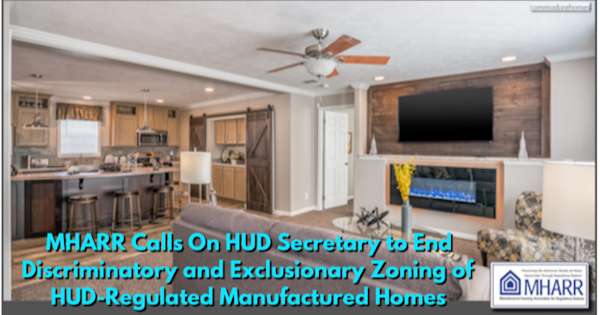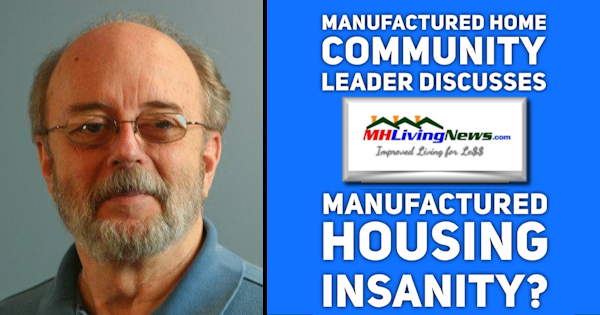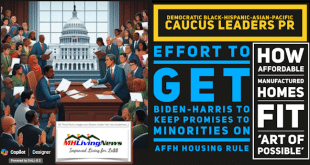What follows below is a letter to the editor of MHLivingNews from a community resident-leader. It is worth mentioning that this person has lived and owned in conventional housing before moving into a manufactured home in a land-lease community. He loves his manufactured home, as he has said on his own blog. He enjoys the community, neighbors, and lifestyle. But the couple – along with others – do see a serious challenge.
It is that challenge that he is addressing with this letter to the editor. He wrote this and sent the comments that follow after reading an article linked here.
While we editorially may concur with much of what the writer said, the views below are his.
With that introduction, here is his letter.
Insanity Is Doing the Same Thing Over and Over Again
and Expecting Different Results.
Yet, that is exactly what major political and industrial leaders are telling us to do. That is what Frank Rolfe and his investment partners are self-servingly advising others to do.
Tim Sheahan, when he was president of the National Association of Manufactured Home Owners (NMHOA) noted in a document linked here that when there was plenty of competition and new land-lease manufactured home (MH) communities were coming online, that the law of supply and demand kept site fees affordable.
Unfortunately, there have reportedly been no new communities in California in the past thirty years and only a few hundred in the USA since 2000. Meanwhile, thousands of manufactured home communities have closed. There is plenty of demand, but not enough supply.
Recently voices have begun to be heard, across the political divide, speaking up for change.
HUD Secretary Carson has been promoting the increased use of manufactured housing in speeches, in interviews, and in the June 2019 Innovative Housing Showcase sponsored by HUD and the National Association of Home Builders (NAHB). When NAHB is co-sponsoring factory-building methods, doesn’t that speak volumes?
Minnesota Senators Carolyn D. Laine, Democrat District 41, and Mark W. Koran, Republican District 32, are working together on a broad-based and bipartisan group in the Legislature that is pushing for state investment on a par with other forms of housing.
“To construct a new single-family manufactured home development including all neighborhood infrastructure costs, the typical price per unit is $150,000. In comparison, a high-density apartment complex usually costs $250,000 per unit to construct.”
Look at those cost figures. I wonder what the current cost per unit is for the new site-built homes that are being developed in Sacramento County would be? Guaranteed, they will not be considered affordable. In fact, I see new senior communities that are being advertised with starting prices in the “high $500K”. Why aren’t there new Manufactured Home Communities with homes being advertised, starting in the “low $200K”?
The National Association of Realtors Chief Economist Lawrence Yun, Ph.D., has said that only by building millions of more homes can the affordable housing crisis be resolved.
Rent control might, in some cases, be a necessary band-aid until that housing gets built. But ultimately, more affordable homes must be constructed. Because construction labor shortages and local regulations are making conventional building slow and costly, site-built homes will not likely be able to keep up with the estimated eight million housing units needed nationwide. That means that only some form of factory home building can fill the gap. Those homes would obviously need home-sites to go to for permanent installation.
HUD at the federal level and HCD at the California State level need to move forward, vigorously, with enforcing the federal laws related to federal Enhanced Preemption for manufactured homes. We need to be able to streamline regulatory approval for manufactured homes and manufactured home communities at all levels. That would lower the cost and time to market for new homes and communities that are affordable, without compromising quality.
I am talking about infill housing sites that are privately owned as well as those in Manufactured Home Communities. You have a vacant lot in a local neighborhood that can’t be scheduled for a new site-built home? Why don’t you lay a foundation and bring in a Manufactured Home? Oh, that’s right. In most community local zoning regulations don’t allow you to do that. This the need to enforce the federal law on manufactured housing’s enhanced preemption under the Manufactured Housing Improvement Act of 2000.
In addition to dealing with the regulations around building Manufactured Homes, we need financial agencies to actively follow the original spirit of “Affirmatively Furthering Fair Housing (AFFH)” and develop the needed financial environment to support this type of effort.
Contrary to the original vision, today it is the larger multi-million to multi-billion dollar investment companies who are buying up the manufactured home communities that have no problems placing large mortgages on Manufactured Home Communities. The payment for those loans are coming from the rent increases placed on low and middle income homeowners who rent space in those parks. The purchase of those homes are often supported by high interest rate personal property loans. Why? The excuse is that they are supposedly movable. That may have been true decades ago, but some 80% of today’s manufactured homes have never moved from their original site.
Finally, a normal house can be refinanced easily, regardless of its age. I would argue that any HUD compliant manufactured home should also be eligible, regardless of its age, to have access to competitive refinance opportunities. Unlike a conventional house, the quality of a manufactured home is repeatedly checked at the time of manufacture by the producers and by third-party inspections. I refinanced my previous house with a VA loan. Although that site built house was originally constructed in 1920, there weren’t any problems getting a loan. Yet, I could not get VA financing on the 1980 HUD compliant manufactured home I now live in, because it was classified as ‘too old.’ I have not had a single issue with this home that wasn’t similar to ones I’ve had in previous site-built homes.
On top of all that, as the demand rises the quality of site-built homes appears to be falling; Foundation Failures…Why so many in Texas? Factory built homes get inspected before they leave the factory.
As some 22 million Americans already know, manufactured homes are the most proven solution to cost-effective, appealing, and unsubsidized quality homes. Everything points to using some form of factory home building to fill the housing shortage gap. Just keep in mind that those homes obviously need home sites to go to for permanent installation.
With that preface, let me outline the two key points, and then deal with each systematically. This presupposes an understanding of the issues, which is research and historical in nature. Enforcing good existing federal laws that would deal with a large portion of the supply side of this issue.
There is a need for a clear focus. We need to address the problem summarized by the UCLA Center for Health Policy Research Health Policy Fact Sheet, August 2018.
“In 2016, more than three-quarters of low income older Californians whose head of household is age 65 or over are ‘rent burdened,’ and more than half are ‘severely rent burdened’.”
That problem is playing out in various parts of the nation at different levels, not only in California. That same source said that in Sacramento County, CA, where I live, 63.7% of the Low-Income Californians Age 65 and Over were severely rent-burdened! This problem is real today and will get worse as the Baby Boomers continue to enter retirement age without sufficient retirement income.
Insanity Is Doing the Same Thing Over and Over Again
and Expecting Different Results.
The current Affordable Housing Crisis and the Homeless Problems will continue to get worse unless we do something different.
We need to focus!
- By enforcing good existing laws, notably the enhanced preemption that is part of the Manufactured Housing Improvement Act of 2000, we need to remove all unreasonable administrative and regulatory barriers to the use of manufactured housing, both as infill housing and in the formation of new manufactured home communities.
- We need to ensure people can safely commit to moving their homes into a manufactured home community while ensuring that community management is financially stable and secure.
Let’s look at those two key factors in depth.
- By enforcing good existing laws, we need to remove all unreasonable administrative and regulatory barriers to the use of manufactured housing, both as infill housing and in the formation of manufactured home communities.
“Contemporary American land use law embodies the bad idea that private land use ought to be publicly planned. In practice, these plans routinely exclude low-income families by indirect means, causing income-based segregation.”
Salim Furth: Housing Supply in the 2010s – Mercatus Center
This will probably be at the center of most of the angry discussions and debates, as this is where most of the toes will be stepped on. We need to get local communities to agree to relinquish control to a central organization, allowing us enforce the good laws that are already on the books. We would then be able to streamline the processes needed to get more, affordable housing in place. This would need to center around the federal laws on Enhanced Preemption, financial regulations, and the antitrust laws.
The problem here is the establishment of trust in the central organizations to be balanced and fair in their decision-making process. We need clear checks and balances to prevent the rise of mini-dictators. Just like we need balances between the rights and needs of the manufactured homeowners and the owners of the community they live in, we also need to verify there is a balance between the central organizations and the smaller communities they are working with.
At every level, there needs to be a careful examination of the rules and regulations that aren’t covered by HUD to ensure they are clear, balanced and enforced. For example, HUD doesn’t mandate the standards for installation of manufactured homes, allowing States to have their own guidelines. They have setup a program to monitor installation standards. Is it working?
We really need to enforce good existing laws, especially the antitrust laws that need to be enforced. We need to break up and fine as appropriate consolidators under antitrust laws who often manipulate the system to their advantage and to the disadvantage of independent businesses, residents, possible buyers, and taxpayers. But we also look at the costs of compliance that have been placed on small businesses. Too many small operations have been forced to merge into large companies, because licensing and regulatory costs were putting them out of business.
- We need to ensure people can safely commit to moving their homes into a manufactured home community while ensuring that community management is financially stable and secure.
Initially, we will need some type of Space Rent Stabilization Ordinance to protect the current residents of Manufactured Home Communities. More and more of them are losing their only investment, their home, because of double-digit rent increases. We, as a community, cannot allow them to be made penniless and homeless because the verbal promises that were made to them are not binding on the new owners. We should explore sunset provisions, the use of rent controls tied to vacancy rates, or other similar methods to support the property owners, while protecting the residents. One creative example is Florida’s Price Gouging law. The goal being to restore the free market balance when the free market is rebuilt.
For the long term, we need to remove all of the barriers to using manufactured housing, both as infill housing and in the form of manufactured home communities. That is the only way we can dig ourselves out of today’s affordable housing crisis. We come up with some type of a contract where people can safely commit to moving there homes into a community. We also need to explore what is need to help the owner of the community to be financially stable and secure.
We need to explore and document other options, such the conversion of existing parks to Resident Owned Communities that don’t disadvantage the seller, but give residents an opportunity to buy. Can we develop clear guidelines and tools for obtaining financial aid, perhaps with GSE, state, nonprofit or other housing agency supplying the needed management guidance and financing support.
The long-term vision should be to protect the innocent, while allowing all the small businesses and community efforts to flourish. This will be needed to open things up in a way that is visibly fair and balanced while providing the much-needed growth in the availability of affordable housing.
We also need to create an environment where all levels of government and business put compassion at the top of their evaluation lists. We will not achieve our goals if we allow local pride or hurt feelings to dictate the fate of the severely burdened members of our community.
We are better than that. ##

President: Mobil Country Club Home Owners Association
Member of Legislative Action Team: Golden State Manufactured-Home Owners League
Representative: Sacramento Area Coalition of Mobilehomeowner Associations
Rancho Cordova, CA 95670
Van Cleef mentioned interviews with HUD Secretary Carson. One of those interviews is shown below.
It is worth mentioning that prior HUD Secretary Julian Castro was also pro-manufactured housing, as the video below reflects. But for whatever reasons, Castro did not do as many obvious public interviews on the topic as Dr. Carson has done.
That said, former Secretary Castro has spotlighted some of the challenge in communities that Van Cleef mentions. See that in the report linked here.
That said, Van Cleef has frankly gone more thoughtfully into crafting the outline of a plan that could bring many ‘white hat’ professionals, potentially millions of manufactured home community residents and HUD Code manufactured homeowners together in a practical fashion. Let’s see what sort of response this letter gets from our readers. See the related reports below for more insights on these issues.
Keep in mind that some similar challenges exist in the site-built housing world, with rapidly rising property taxes, HOA fees, rising rents, etc. The irony is that the majority of housing owners, not only manufactured home owners, would benefit by having more housing supply.
One-point worth nuancing. Some fear the federalization of housing. Using enhanced preemption, properly understood, is not that. The American way is to give people choice. The local ‘mini-dictators’ Van Cleef mentions keep people from exercising a right that they arguably already have. Enhanced preemption puts choice back into the hands of those who want and need the affordable housing.
Van Cleef cited the Manufactured Housing Association for Regulatory Reform (MHARR) in various links. Their president, Mark Weiss, J.D., said the following to MHLivingNews recently on the subject of the importance of the principle of enhanced preemption.

Finally, let’s note that the minority of manufactured home properties are owned by these consolidators that have caused so much rancor. For those pondering the manufactured home community lifestyle, you should carefully research any land-lease community you may want to consider. “We Provide, You Decide.” © ## (Lifestyle news, analysis, and commentary.)

Soheyla is a managing member and cofounder of LifeStyle Factory Homes, LLC, the parent company to MHProNews, and MHLivingNews.com. Connect with us on LinkedIn here and here.
Related Reports:
Click the image/text box below to access relevant, related information.









 manufacturedhomelivingnews.com Manufactured Home Living News
manufacturedhomelivingnews.com Manufactured Home Living News































